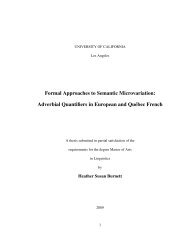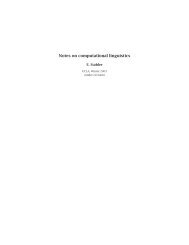A Grammar of Miya - UCLA Department of Linguistics
A Grammar of Miya - UCLA Department of Linguistics
A Grammar of Miya - UCLA Department of Linguistics
You also want an ePaper? Increase the reach of your titles
YUMPU automatically turns print PDFs into web optimized ePapers that Google loves.
228<br />
A <strong>Grammar</strong> <strong>of</strong> <strong>Miya</strong><br />
(57) Jee faara takay aa Mangila 'gnaa Gituwa:<br />
Nakan duw, "Mgn dg faara buwahiyu-wun!"<br />
Nakan duw, "Mgn dg faara buwahiyu-wun!"<br />
'Then Mangila and Gituwa started arguing: (see fn. 14 for word order)<br />
This one says, "I was the first to come!"<br />
That one says, HI was the first to come!'"<br />
(58) Niykin dg baa-t1gn aakan ha niykin,<br />
niykin dg baa-t1gn aakan ha niykin.<br />
'These [people] went to the house <strong>of</strong> those [people], (and)<br />
those went to the house <strong>of</strong> these.'<br />
Similarly, 'lykin 'here' can be repeated to mean 'here ... there':<br />
(59) "Nay'iykan." Dg nayaw. "Nay ·iykan." Dg nayaw.<br />
'''Look here." He looked. "Look there." He looked.'<br />
4. Nonn Phrases withont Determiners vs. Noun Phrases with Determiners<br />
The majority <strong>of</strong> nouns that appear in discourse have no overt indefinite or definite determiners<br />
<strong>of</strong> the types described in §§ 1_3. 16 One must therefore ask what factors allow a<br />
noun to appear with no overt determiner. There are three broad factors which account for<br />
such cases: referential nouns determined by something other than one <strong>of</strong> the determiners<br />
described in §§1-3 (§4.1); nouns used generically (§4.2); and nouns which are inherently<br />
definite (§4.3). There are some residual cases which I cannot explain where noun phrases<br />
lacking overt determiners appear in similar contexts to noun phrases with determiners.<br />
4.1. Referential nonns with specifiers other than determiners<br />
4.1.1. Genitive phrases as determiners. Referential nouns are nearly always<br />
marked as such in some way. The majority have either a referential indefinite determiner<br />
(§ I) or some definite determiner (§§2-3). Another large class comprises nouns which are<br />
N I in a genitive construction as in the following examples:<br />
(60) shim ta wiy 'somebody's farm'<br />
(61) a. kwaa dgnga duw sgm dg miy-uwsg, koo shim tuwsa ta bay gan mil dgr5itim ...<br />
'if one says that a man has died, even if his farm is as far as 10 miles .. .'<br />
160f the common nouns appearing in ten pages <strong>of</strong> running text, the following figures emerged:<br />
some sort <strong>of</strong> overt determiner (indefinite, definite, universal quantifier) 47<br />
no overt determiner 130<br />
TOTAL 177<br />
However, <strong>of</strong> the nouns without an overt determiner, 44 are Nt <strong>of</strong> a genitive construction and thus have N2<br />
as their determiner. In most <strong>of</strong> the examples, N2 is a proper name, a pronoun, or a noun with a definite<br />
detenniner. Thus, over half the nouns in the sample (47 + 44 = 91 out <strong>of</strong> 177) are determined in some<br />
way.<br />
9. Reference, Definiteness, Universality, and Reflexivity (§4)<br />
b. daga dam eewuya, 'an ta san n-aaGituwa dg baa-z ee kuwa aabiy<br />
'one day, the Wife <strong>of</strong> the man <strong>of</strong> Gituwa went to draw water'<br />
(62) a. kwaa piya aakarn aa jifg naaza ka, a tarde 'an tUWSd rna n-aakam-uw<br />
'when her husband returns home, he will find that his wife is not at home'<br />
b. dg dzara-tlgn-ay, san n-aaMangila dg b-uwsg h-uws-ay<br />
'they separated and the man <strong>of</strong> Mangila went to his place'<br />
In the examples in (60) and (6Ia, b), NI has not been previously mentioned.<br />
However, no indefinite determiner (§I) is needed with NI since the noun is determined by<br />
an indefinite referential N2 in (60) and by definite N 2 's in (61), appearing as a pronoun in<br />
(6Ia) and as a proper noun in (61b). In (62a, b), NI has been previously mentioned,<br />
hence is definite. However, no definite determiner is needed for the same reason no<br />
determiner is needed in (6Ia, b).<br />
Though N I in a genitive construction is rarely marked by a determiner, determiners are<br />
not syntactically precluded from genitive constructions:<br />
(63) kwaa biy dgnga duw a kwiy su niywiy sdbd niyma ka ... [Indefinite]<br />
'if it is said that one has captured some people <strong>of</strong> ours ... '<br />
(64) daga nay-uws aa naka san n-aaGituwa, jee dgnga-ya ... [Demonstrative]<br />
'when that man <strong>of</strong> Gituwa saw him, he said to him .. .'<br />
(65) a. jee kiya gwalfg dg tsaa Gituwa, waataw, ngana gwalfa ka jii Sarkin Duwtsiy [PRM]<br />
'then they took the chieftainship and gave it to Gituwa, that is, the name <strong>of</strong> the<br />
chieftainship is "Sarkin Duwtsiy'"<br />
b. too niy azuwriya ha-fa ka dg kiya gangan [PRM]<br />
'well those <strong>of</strong> your clan begin drumming'<br />
c. dg b-uwsg saar aakan hajifa na 'an ka [PRM]<br />
'he goes <strong>of</strong>f to the house <strong>of</strong>the husband <strong>of</strong> that woman'<br />
In terms <strong>of</strong> function, the indefinite determiner in (63) forces a partitive interpretation,<br />
which would not clearly emerge from the genitive NP without a determiner (see §4.3.2).<br />
The function <strong>of</strong> ndka in (64) is not clear; the sentences preceding and following this one<br />
have a phrase with no determiner, san n-aaGituwa, which is definite in all its occurrences<br />
here. In (65b), kd probably functions as a topic marker (§2.1.2), but in (65a, c) it is a<br />
mark <strong>of</strong> previous reference (see §2.1.! and below for further discussion).<br />
The problem in all these examples is knowing whether the determiner has in its scope<br />
just the noun to which it is adjacent or the entire NP. For phrase initial determiners as in<br />
(63) and (64), it is not clear that there would be any logical difference between just NI<br />
being determined or the whole NP-the whole NP will be definite or indefinite depending<br />
on the definiteness <strong>of</strong> the head (N I ). Where the determiner is phrase final as in (65), it<br />
appears that the determiner may modify just N2 or the whole phrase, but not just N I. In<br />
229
















